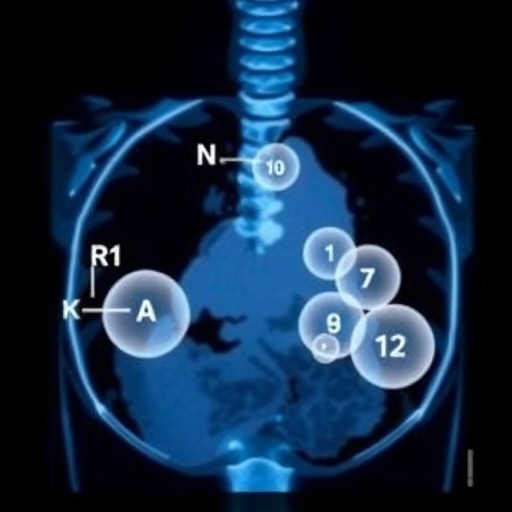In a groundbreaking study, researchers have identified a significant link between serum potassium levels and the 28-day mortality rates of elderly patients suffering from sepsis. With an increasing number of sepsis cases reported globally, especially among the elderly population, understanding the risk factors that influence mortality is crucial. The recent multicenter cohort study spearheaded by Liu, Lin, Gao, and colleagues shines a light on how potassium levels can serve as a predictive marker for clinicians attending to severely ill patients.
Sepsis, a life-threatening condition caused by the body’s extreme response to infection, poses a serious risk to the elderly, whose physiological resilience may be diminished. As numerous studies have shown, the management of electrolytes, particularly potassium, can often slip under the radar in critical care. However, the new research suggests that monitoring these levels could be pivotal in improving patient outcomes. Potassium plays a vital role in several key physiological functions, including nerve transmission and muscle contraction, and imbalances can lead to serious health complications.
This study analyzed a cohort of elderly patients diagnosed with sepsis across multiple hospitals, carefully tracking their serum potassium levels alongside other vital parameters such as blood pressure, heart rate, and lab values. The researchers employed rigorous statistical methods to control for confounding variables, ensuring that the correlation observed between low or elevated potassium levels and increased mortality rates was robust and reliable. The findings indicated that both hypokalemia (low serum potassium) and hyperkalemia (high serum potassium) were associated with increased mortality, prompting further inquiry into the mechanisms at play.
One compelling aspect of the study was the demonstration of how electrolyte imbalance can complicate existing medical conditions in elderly patients. As the body ages, the renal system often struggles to maintain electrolyte homeostasis, which can lead to the fragile state observed in many elderly sepsis patients. The research emphasizes the importance of regular monitoring of serum electrolytes in this vulnerable population, providing both preventative and therapeutic avenues to be explored.
The implications of these findings are enormous. They not only underscore the need for a comprehensive approach in the management of sepsis among elderly patients but also prompt a reevaluation of healthcare practices regarding electrolyte monitoring. Despite the clear link established by the study, the researchers urge caution—potassium levels should not be interpreted in isolation but in the context of the overall clinical picture.
Moreover, the study puts forth a recommendation for establishing standard protocols that incorporate potassium monitoring into sepsis treatment guidelines, particularly for older adults. Clinicians may need to adapt their daily practices and prioritize electrolyte equilibrium as a central component of sepsis care. Recognizing the biochemical pathways influenced by potassium can enable healthcare providers to devise targeted interventions that could mitigate mortality risk.
These findings have sparked conversations not only in academic circles but also within clinical settings, urging teams to reconsider their electrolyte management strategies. Patients suffering from sepsis can manifest a variety of symptoms and indicators, but those involving potassium levels could prove crucial in making early interventions which are often decisive in critical care scenarios.
One intriguing suggestion from the research promotes a multidisciplinary approach leveraging expertise from nephrologists, geriatricians, and critical care specialists. Such collaboration could facilitate a more nuanced understanding of electrolyte management and its consequences in aging populations, thus enhancing patient-centered care.
Critical care protocols are evolving rapidly as new data emerges, and the understanding of sepsis continues to deepen. This study represents a timely contribution to that body of knowledge, while also igniting discussions around the implementation of potentially life-saving treatment regimens based on simple yet often overlooked laboratory results.
In an era where the focus on personalized medicine continues to gain traction, being able to predict outcomes based on specific serum levels can help tailor interventions uniquely suited to individual patients. The researchers suggest that establishing guidelines around potassium monitoring could ultimately lower the 28-day mortality rate associated with sepsis among elderly individuals.
As scientific inquiry progresses, it remains essential for medical practitioners to stay informed and integrated into the evolving landscape of research. The comprehensive study stands as a clarion call to researchers and clinicians alike to consider the potent implications of electrolyte management within critical care.
In summary, the study posits that serum potassium levels are not merely incidental lab values; rather, they could be central to enhancing the management and outcomes of sepsis in the aging population. As awareness grows, it beckons the question: what other biological markers are waiting to be uncovered that could reshape critical care practices?
The authors conclude that the road ahead entails further research that dives deeper into the nuanced relationship between potassium levels and clinical outcomes in sepsis patients, paving the way for improved therapeutic strategies that indeed save lives.
Subject of Research: Serum potassium levels and 28-day mortality in elderly sepsis patients
Article Title: Association between serum potassium and 28-day mortality in elderly patients with sepsis: a multicenter cohort study
Article References: Liu, X., Lin, Q., Gao, K. et al. Association between serum potassium and 28-day mortality in elderly patients with sepsis: a multicenter cohort study. BMC Geriatr 25, 896 (2025). https://doi.org/10.1186/s12877-025-06574-5
Image Credits: AI Generated
DOI: https://doi.org/10.1186/s12877-025-06574-5
Keywords: Serum potassium, elderly, sepsis, mortality, critical care, electrolyte management, hypokalemia, hyperkalemia, cohort study.




